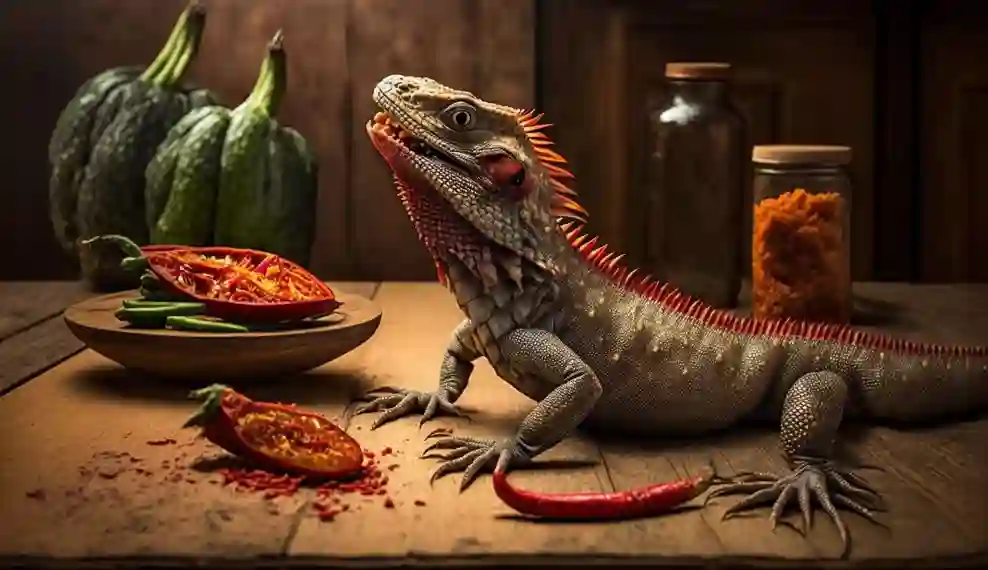When it comes to feeding peppers to your pet bearded dragon, you might wonder which one to feed and avoid. While it’s true that peppers can make a tasty treat for your pet, it is important to know which ones to feed and which ones to avoid.
Did you know that peppers can be toxic to your bearded dragon if fed in large amounts? This is why it is important to choose the right peppers and feed them in moderation.
In this article, we will discuss which peppers are safe for bearded dragons and which ones to avoid.
Types Of Peppers Bearded Dragons Can Eat
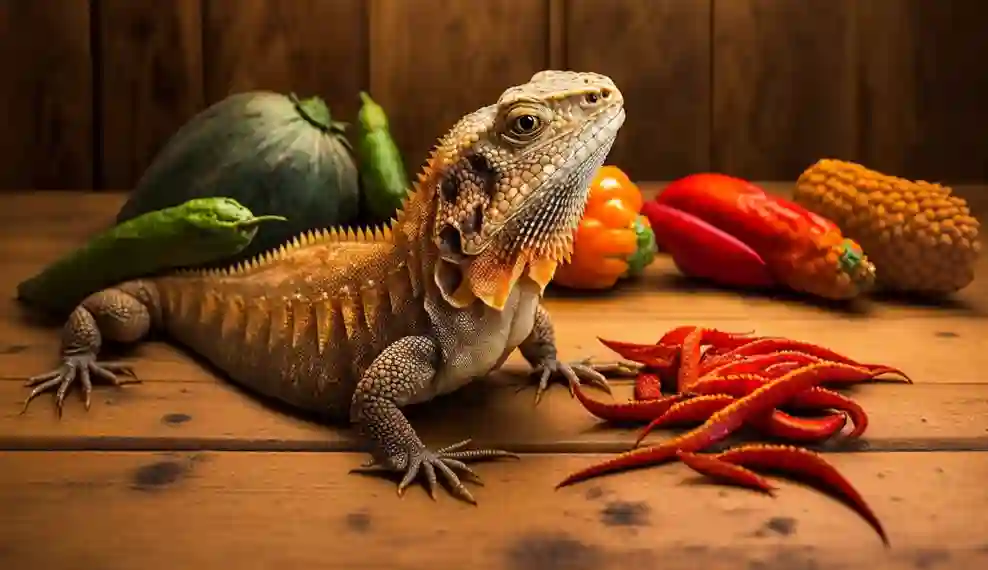
There are many types of peppers available that can provide your pet with the essential vitamins and minerals they need for optimal health.
Bearded dragons can eat bell peppers, chili peppers, banana peppers, jalapeno peppers, and cubanelle peppers, but they should only be given these foods in very little in amounts.
Here is a list of different types of peppers that bearded dragons can eat:
- Bell Peppers – Bearded dragons can eat all colors of bell peppers, including green, red, yellow, and orange. These peppers are a great source of vitamin C and fiber.
- Jalapeno Peppers – While jalapenos are safe for bearded dragons to eat, they are very spicy and may cause digestive upset if consumed in large amounts. It’s best to offer small amounts of jalapenos as a treat.
- Poblano Peppers – Poblano peppers are a mild variety of pepper and are safe for bearded dragons to consume. They are a good source of vitamin C and potassium.
- Cayenne Peppers – Cayenne peppers are very spicy and should be avoided. They may cause digestive upset and discomfort for your bearded dragon.
- Habanero Peppers – Habanero peppers are very spicy and should be avoided. They can cause digestive upset and discomfort for your bearded dragon.
- Cubanelle Peppers – Cubanelle peppers are a mild variety of pepper and are safe for bearded dragons to consume. They are a good source of vitamin C and potassium.
- Sweet Peppers – Sweet peppers, such as banana peppers and bell peppers, are safe for bearded dragons to consume. They are a good source of vitamins and minerals.
- Anaheim Peppers – Anaheim peppers are a mild variety of pepper that are safe for bearded dragons to consume. They contain vitamin C and are a good source of fiber.
- Cherry Peppers – Cherry peppers are a small, sweet pepper that can be offered to bearded dragons as a treat. They are a good source of vitamin C.
- Green Chiles – Green chiles are a mild variety of pepper and are safe for bearded dragons to consume. They contain vitamin C and are a good source of fiber.
- Red Chiles – Red chiles are a spicy variety of pepper and should be offered in moderation to bearded dragons. They can cause digestive upset and discomfort if consumed in large amounts.
- Serrano Peppers – Serrano peppers are a spicy variety of pepper and should be offered in moderation to bearded dragons. They contain vitamin C and are a good source of antioxidants.
- Thai Peppers – Thai peppers are a very spicy variety of pepper and should be avoided. They can cause digestive upset and discomfort for your bearded dragon.
Types Of Peppers To Avoid Feeding To Bearded Dragons
- Hot peppers: Hot peppers such as jalapenos, cayenne, habanero, and serrano peppers contain a compound called capsaicin, which can cause digestive problems in bearded dragons. Capsaicin can cause irritation to the digestive tract and may lead to diarrhea or vomiting.
- Pepper flakes or powders: Pepper flakes or powders can be difficult for bearded dragons to digest and can cause irritation to their digestive tract.
- Pepper seeds and stems: Pepper seeds and stems can also be difficult to digest and may cause blockages or impactions in the digestive tract, which can be very dangerous for bearded dragons.
Benefits Of Feeding Peppers To Bearded Dragons
Are you wondering what vegetables to feed your bearded dragon? Peppers are a great option. Around 95% of the diet of a bearded dragon should come from fresh, leafy greens and vegetables. And peppers can provide essential nutrition for optimal health.
Here’s why they make such a good choice.
Vitamin A is vital for healthy eyesight and helps support immunity against disease. Peppers also contain vitamins C, K, E, and B6 as well as key minerals like iron, magnesium and potassium. All of these nutrients help keep your pet in top shape – both inside and out!
On top of that, peppers offer an excellent source of dietary fiber which helps with digestion and prevents constipation in reptiles. The vegetable is low-calorie too so you don’t have to worry about overfeeding your pet while providing them with all the necessary nutrition their body needs.
Peppers may seem small but they offer big nutritional rewards when added to a balanced reptile diet – helping ensure your pet stays happy and healthy for many years to come.
Potential Risks Of Feeding Peppers To Bearded Dragons
When it comes to feeding peppers to bearded dragons, there are some potential risks that should be taken into consideration.
First and foremost, peppers can contain toxins that could cause poisoning in reptiles, including bearded dragons.
It’s important to choose bell peppers over other kinds of peppers because they have the least amount of toxicity.
It’s also essential to remember that not all peppers provide adequate nutrition for bearded dragons.
For example, sweet peppers don’t offer enough vitamins and minerals needed for proper growth and development in reptiles.
On top of this, many people mistakenly think that hot peppers are a good source of calcium but they actually contain oxalates which can interfere with calcium absorption and lead to health problems down the line.
So if you do decide to feed your bearded dragon pepper, stick with bell peppers only and be sure to include plenty of other high-quality foods like leafy greens and insects in their diet too.
That way you’ll ensure they get all the nutrition they need without running any serious risks from toxic ingredients found in certain types of peppers.
Feeding Peppers to Bearded Dragons: Which Pepper they can Eat?
Can Bearded Dragons Eat Bell Peppers?
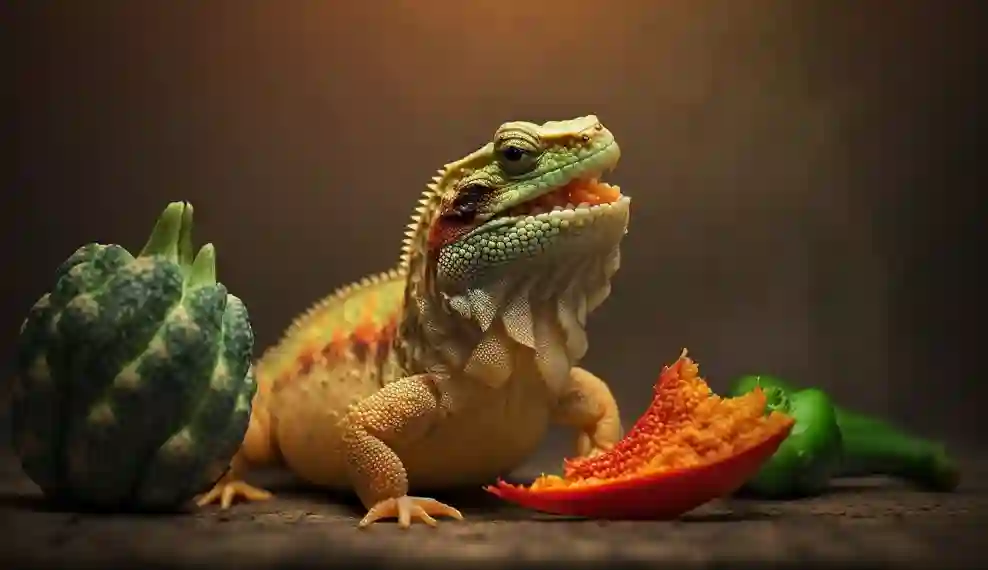
Yes, bearded dragons can eat bell peppers in moderation. Bell peppers contain vitamins and minerals that are healthy for bearded dragons, such as antioxidants, vitamins A and C.
It is important to note that conventionally grown sweet pepper may have pesticide residues that can affect your pet’s health.
Can Bearded Dragons Eat Hot Peppers?
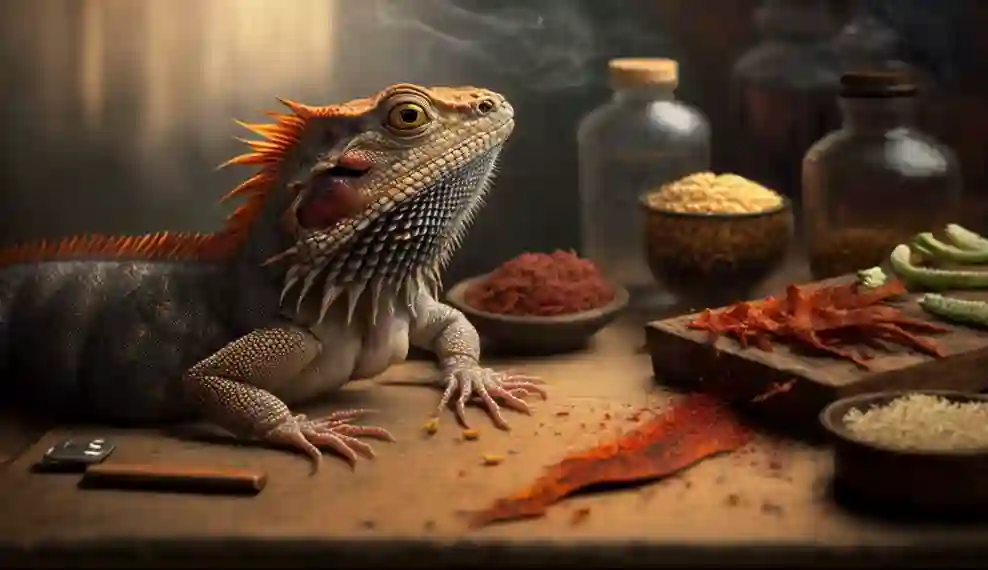
Bearded dragons can eat Hot Peppers (jalapenos), which are chili peppers and a part of the capsicum family of vegetables and fruits.
It is best to only give your bearded dragon a few tiny pieces of jalapeno if they like it. Jalapenos boost your bearded dragon’s immune system and digestion.
It is not recommended to make jalapenos a staple food for your pet as the nutritional value does not compare to other vegetables like collard greens, beet greens, and other safe greens that provide the required vitamins and minerals your pet needs.
Can Bearded Dragons Eat Mini Sweet Peppers?
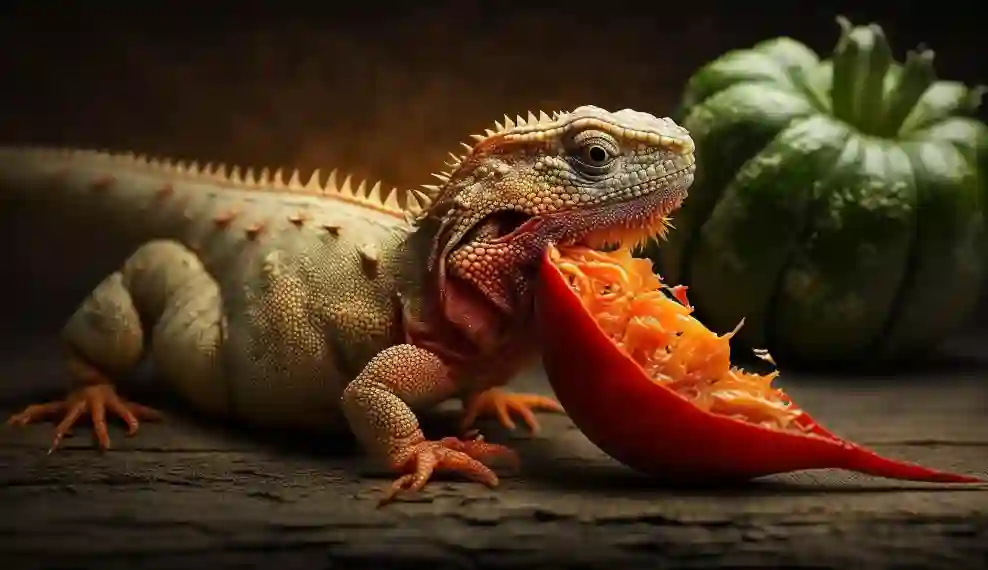
Yes, bearded dragons can eat mini sweet peppers. Mini-sweet peppers contain vitamins and minerals that can be beneficial for your bearded dragon’s health.
It is important to remove the stem and seeds before feeding them to your pet and to feed them in moderation.
Can Bearded Dragons Eat Banana Peppers?
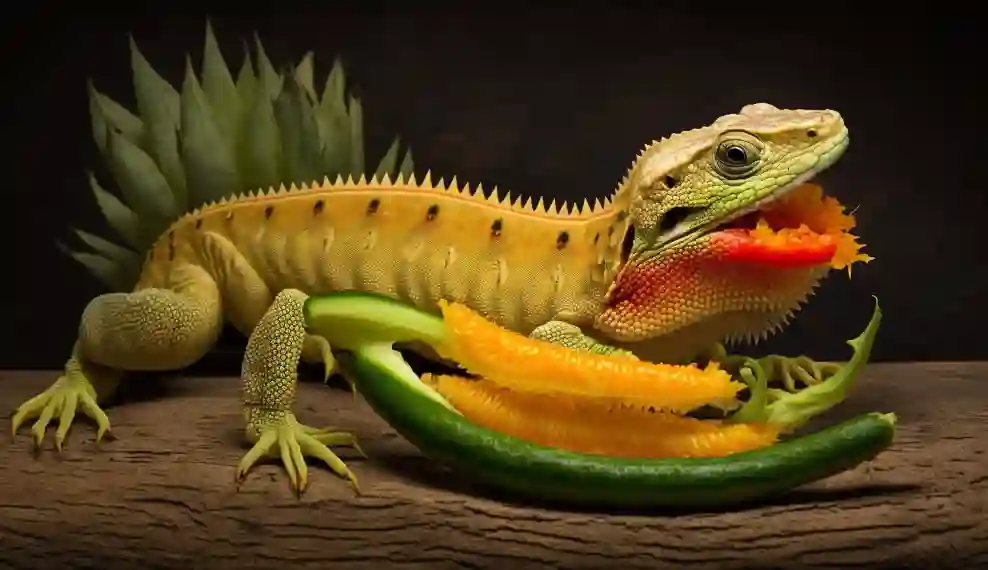
No, bearded dragons should not eat banana peppers as they are high in acidic content which can be detrimental to their health.
When bearded dragons eat acidic food, it eats away at the lizard’s bone structure and can damage their esophagus and kidneys.
Banana peppers are also not nutritious for bearded dragons as they have no appreciable nutritional value.
Instead of banana peppers, some alternatives for bearded dragons are bell pepper, sweet corn, peas, carrots, kale, cucumber, and parsley. These items are high in dietary fiber that helps bearded dragons digest.
Can Bearded Dragons Eat Poblano Peppers?
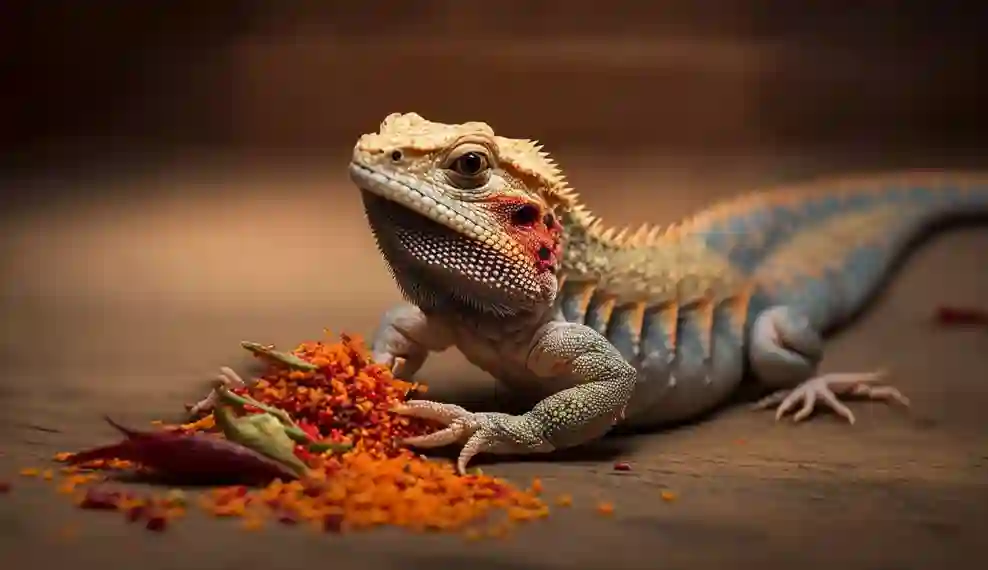
Poblano peppers are not mentioned anywhere and no one ever tried that. However, since bell peppers are safe for bearded dragons to eat, it is possible that poblano peppers may also be safe for them to consume.
It is important to note that just because a food is safe for a bearded dragon to eat does not necessarily mean it should make up a significant portion of its diet or be fed every day.
Can Bearded Dragons Eat Chili Peppers?
No, bearded dragons should not eat chili peppers. Chili peppers are a type of hot pepper that contains capsaicin, which can cause digestive problems and irritation in bearded dragons.
Feeding your bearded dragon chili peppers can lead to stomach upset, vomiting, and diarrhea, among other health problems. Therefore, it is best to avoid feeding your bearded dragon chili peppers altogether.
Can Bearded Dragons Eat Sweet Bell Peppers?
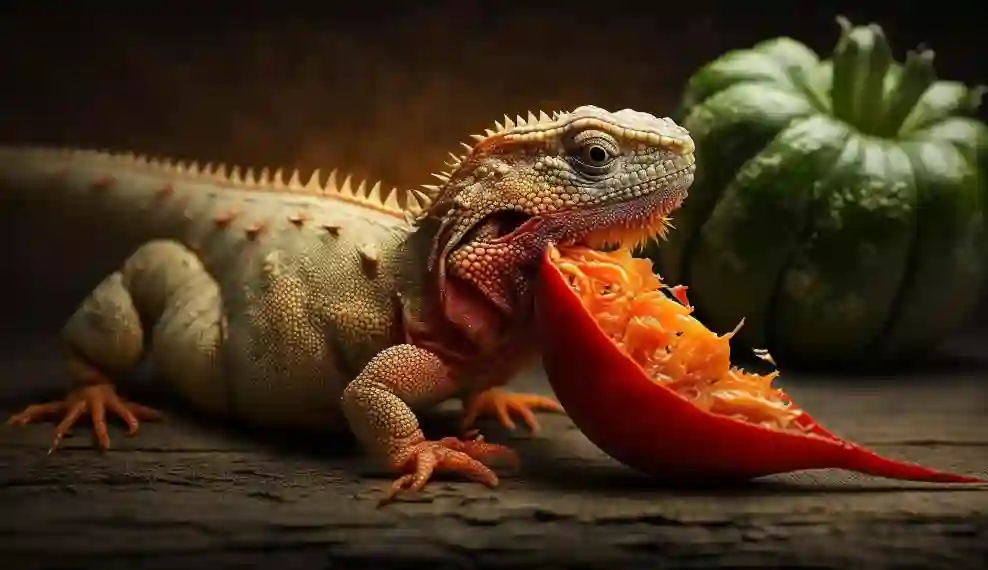
Yes, bearded dragons can eat sweet bell peppers. Sweet bell peppers contain vitamins and minerals that are healthy for bearded dragons, such as antioxidants, vitamins A and C.
It is important to note that conventionally grown sweet peppers may have pesticide residues that can affect your pet’s health.
Can Bearded Dragons Eat Red and Yellow Peppers?
Yes, bearded dragons can eat red and yellow peppers. Bell peppers are a good source of vitamins and minerals that are healthy for bearded dragons.
Red bell peppers are the most nutritious because they are fully ripened. However, green bell peppers are not as nutritious as other colored bell peppers because they are not as developed and ripe.
Can Bearded Dragons Eat Orange Bell Peppers?
Yes, bearded dragons can eat orange bell peppers. Bell peppers are a healthy food option for bearded dragons as they contain vitamins and minerals that are beneficial for their health.
Can Bearded Dragons Eat Jalapeno Peppers?
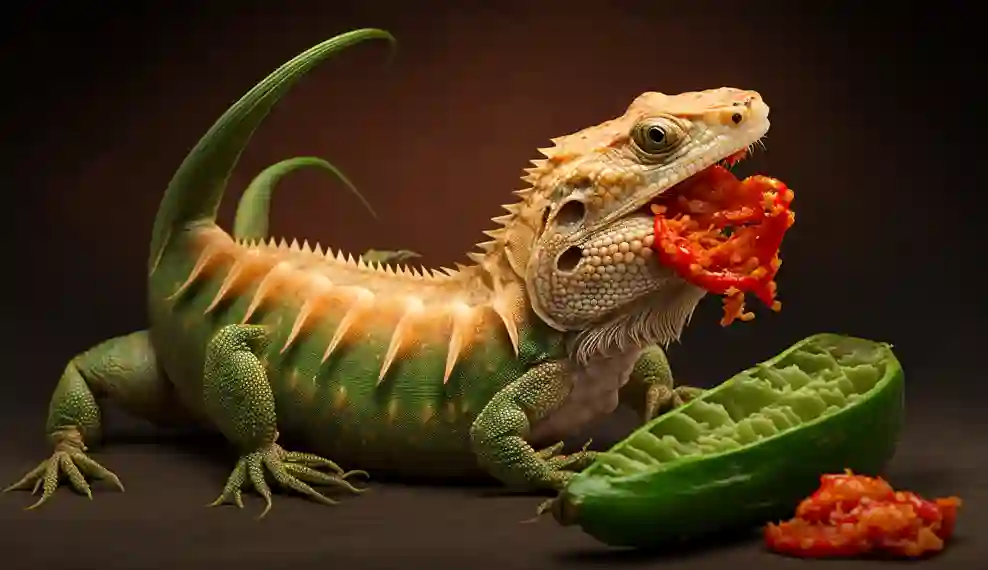
Yes, bearded dragons can eat jalapeno peppers. However, it is not recommended to feed them frequently or in large quantities due to the capsaicin content that can irritate their digestive system.
It is important to provide a balanced diet for your bearded dragon and consult with a veterinarian if you have any concerns about its nutrition.
Can Bearded Dragons Eat Cubanelle Peppers?
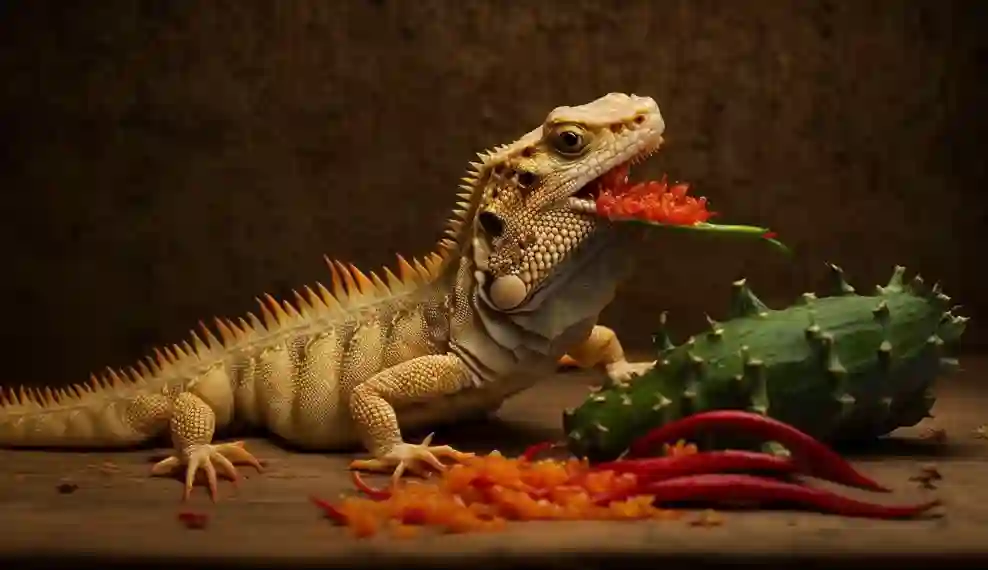
Yes, bearded dragons can eat bell peppers, including cubanelle peppers. Bell peppers are a good source of vitamins and minerals that are healthy for bearded dragons.
They contain Vitamin A, which is essential for bearded dragons to help them see, reproduce, and grow well. However, it is important to feed bell peppers to bearded dragons in moderation. Overfeeding can lead to diarrhea because bell peppers are full of water.
Frequently Asked Questions
What Is The Optimal Amount Of Peppers To Feed A Bearded Dragon?
The optimal amount of peppers to feed a bearded dragon depends on the age, size, and health of the individual dragon. Generally, adult bearded dragons can eat up to 4 peppers per week. Younger dragons should be given fewer peppers and any additional peppers should be given in moderation.
How Often Should Peppers Be Fed To Bearded Dragons?
Bearded dragons should be fed a variety of foods, including vegetables and occasional fruits. Peppers should be fed to your bearded dragon 1-2 times per week, in small quantities. Too much of any one food can cause digestive problems, and peppers are no different.
What Other Vegetables Can Be Safely Fed To Bearded Dragons?
Other vegetables that can be safely fed to bearded dragons include bell peppers, squash, turnips, sweet potatoes, carrots, collard greens, endive, radishes, kale, mustard greens, and dandelion greens.
What Are The Signs Of Pepper Toxicity In Bearded Dragons?
Signs of pepper toxicity in bearded dragons may include vomiting, diarrhea, loss of appetite, lethargy, and skin irritation. If you suspect your bearded dragon has ingested peppers, contact your veterinarian right away.
Are There Any Other Potential Health Risks Associated With Feeding Peppers To Bearded Dragons?
Yes, there are potential health risks associated with feeding peppers to bearded dragons. Too much pepper can cause digestive issues like diarrhea, vomiting, and abdominal pain.
In some cases, peppers can also cause allergic reactions and skin irritation. If a bearded dragon eats too many peppers, it may also experience dehydration and electrolyte imbalances. Therefore, it is important to feed peppers to bearded dragons in moderation.
